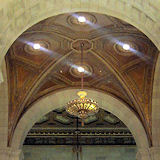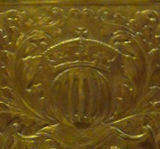




Once upon a time there was a little sprite who thought she was a proper language. The other languages used to mock and call her nasty names on account of her uncertain parentage and dubious personal history. But the little sprite didn't have time to brood on her misfortunes — she was too busy trying to keep track of the offspring resulting from her numerous liaisons, some respectable but most the consequence of grievous centuries of rape and pillage.
Nor was the little sprite an entirely blameless victim of the violent happenings referred to above, having done more than her share of invading foreign lands and leaving her posterity to manage as best it might, whilst bringing back a large, varied, and randomly acquired clutch of questionable linguistic progeny.
For the first millenium (as years are now counted), the little sprite was reasonably happy and contented with herself. From a more or less Anglo mother, and a mainly Saxon father, assisted by uncles of Viking and other Nordic persuasions, the little sprite availed herself of words to describe everything that mattered; horses to ride upon, hounds to hunt with, boats to fish from, beds to sleep upon and kitchens to cook food in, game to eat, wives to hug, husbands to cuddle, children to kiss, serfs to clout. What more could any language need?
And yet the incessant criticism continued, until finally a certain language from Normandy across the water took matters into his own hands and invaded the sprite's homeland, delighting in imposing not only his tongue but also his regulatory will and organising concepts upon a ravished land.
Much of the sprite's island patch already had been besieged and brutally assaulted by soldiers of that Roman empire from which this new intruder was a descendant in the direct line. But those early Latins dreamt only of returning to their homes in sunnier climes, while the Norman gave ominous signs of putting down roots and settling in for a prolonged, even permanent stay. And with his birthplace only a few hours away by boat, it was only a short time before fraternal relations came north across the water to bolster his numbers and assist in an enthusiastic application of the Norman language and customs.
The new linguistic order brought with it a great deal of law-making, as every type of abstraction, of description of things unseen, was forced down the throat of the little sprite even though it bore no likeness to her original tongue such as it was. On the other hand, when the Norman voice could be diverted from organising, and ordering about, it lent itself beautifully to poetry, to song, and to a sensual enjoyment of life.


And so began this loveless marriage of convenience — a highly inconvenient marriage, actually, as far as the little sprite was concerned, but over a long career she'd become hardened to choosing life with dishonour over principled death every time.
The Norman side assumed, with reason, that once he'd had his wicked way with the sprite, matters would follow their usual predictable and unfortunate course in these sad conjugal affairs, with the children of his bed strangling hers whenever the chance arose, until only a few shreds of dialect dealing with home and hearth remained of her original tongue. And so they might have unfolded, had it not been for constant linguistic interference from her fractious kith and kin huddled in impregnable fortresses to the north and to the west. Not even the Norman could force himself onto all of them. And with that lot, sweet talk was out of the question. Then, as now, discretion being the better part of valour, the Norman decided to call himself The Conqueror, and challenge anyone to take the title from him. Up to the present, no one has dared.
Centuries passed. Things changed, though not as expected. Instead of displacing the spawn of the little sprite, the children of the Norman's bed adopted a policy of peaceful but wary coexistence. Ownership was permitted to exist side by side with possession; assets and riches invited and welcomed wealth into their vaults and storehouses; happiness and joy were experienced and felt by all.
The new hybrid language called itself English, and its birthplace England, not that the new label earned it any more respect than it had at the beginning.
Everyone knows that a proper language has a certain consistency in its components as well as relevance between its individual parts, and there was neither relevancy nor consistency in the composite tongue that had gained the ascendancy in the sprite's island kingdom. There was the matter of tenses, and conjugations: English not so much ignored the rules, as created its own abominations, with numerous exceptions that infuriated the neighbours. Worse, other than for purposes of describing actual male and female attributes, it did away with gender.
What the Norman Conqueror thought of this no one knows, but perhaps he remembered that in his native language a man is a man until he becomes a person, or a victim, or suchlike, when he is assigned a feminine identity. In English, he remains masculine throughout, no matter the circumstances. What red-blooded male could resist such linguistic blandishments?
And so the composite language continued not merely to exist, but to flourish.
Poets and playwrights began to create literary masterpieces weaving together all the old words still beloved after these many years by their mother the sprite, but threaded into an intricate tapestry with the abstractions of the Norman ...
...
The quality of mercy is not strain'd,
It droppeth as the gentle rain from heaven
Upon the place beneath: it is twice bless'd;
It blesseth him that gives and him that takes ...
William Shakespeare, The Merchant of Venice, IV. i. 163 [ODQ 464 : 33]
Quality. Mercy. Gentle. Place. Norman bones and skeletal structure, Anglo-Saxon flesh and blood and sinew. Metre instead of rhyme. And today four hundred years later clear and comprehensible in every respect.
And yet the great playwright who created the masterful lines quoted above, also chose, on occasion, for mysterious but specific literary purposes of his own, to dispense altogether with the Norman heritage:—
...
Have more than thou showest,
Speak less than thou knowest,
Lend less than thou owest ...
... King Lear, I. iv. 132 [ODQ 452 : 25]
Apart from adding unimaginable beauty to our lives, the main consequence of these literary masterpieces is to prevent countless obsolete words from dying a natural and well-deserved death. With all this lexicon and vocabulary to keep track of — need it be mentioned that the sprite had learned not merely to accept but actually to love and cherish and protect the offspring of the Norman? — the sprite was no longer spritelike, but had begun to resemble nothing so much as a middle-aged matron. The Norman grumbled a little, but no more than any man who has taken up with a sprite, and found himself tied to a hefty and complicated woman.
And so it goes, with nothing ever remaining constant, or static.
In the next section we follow the inexorable progress of little sprite from Fairy Tale to Myth, or, rather, from 'Goldilocks' to 'The Doomsday Machine'.
________________________